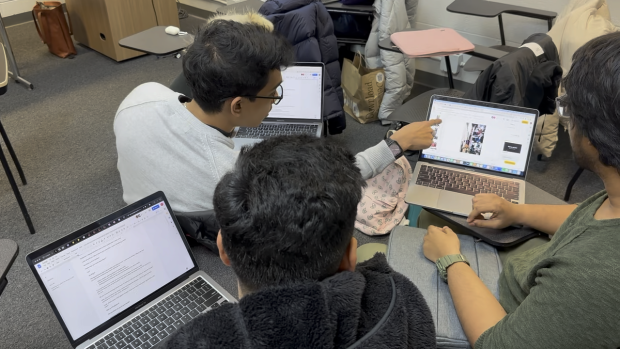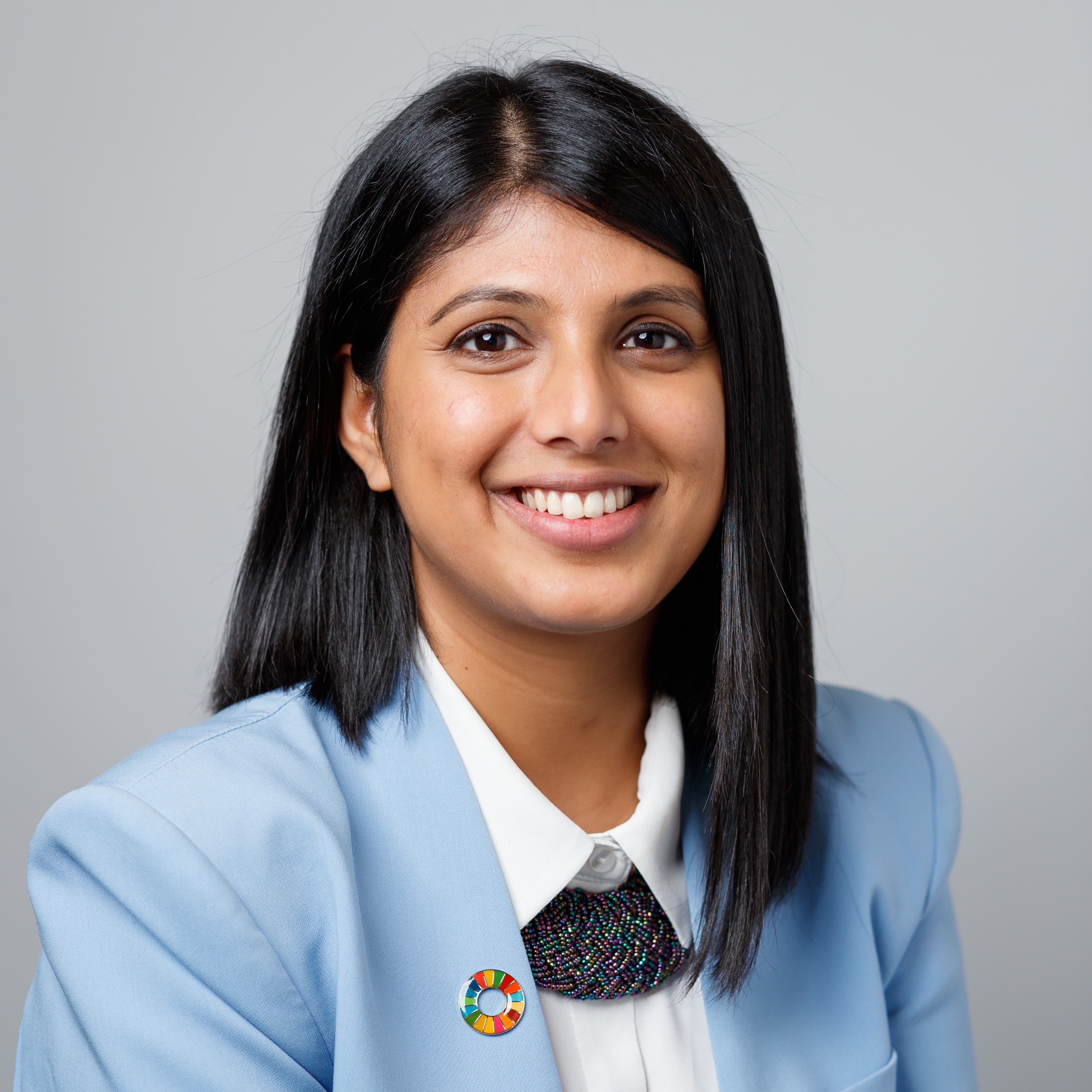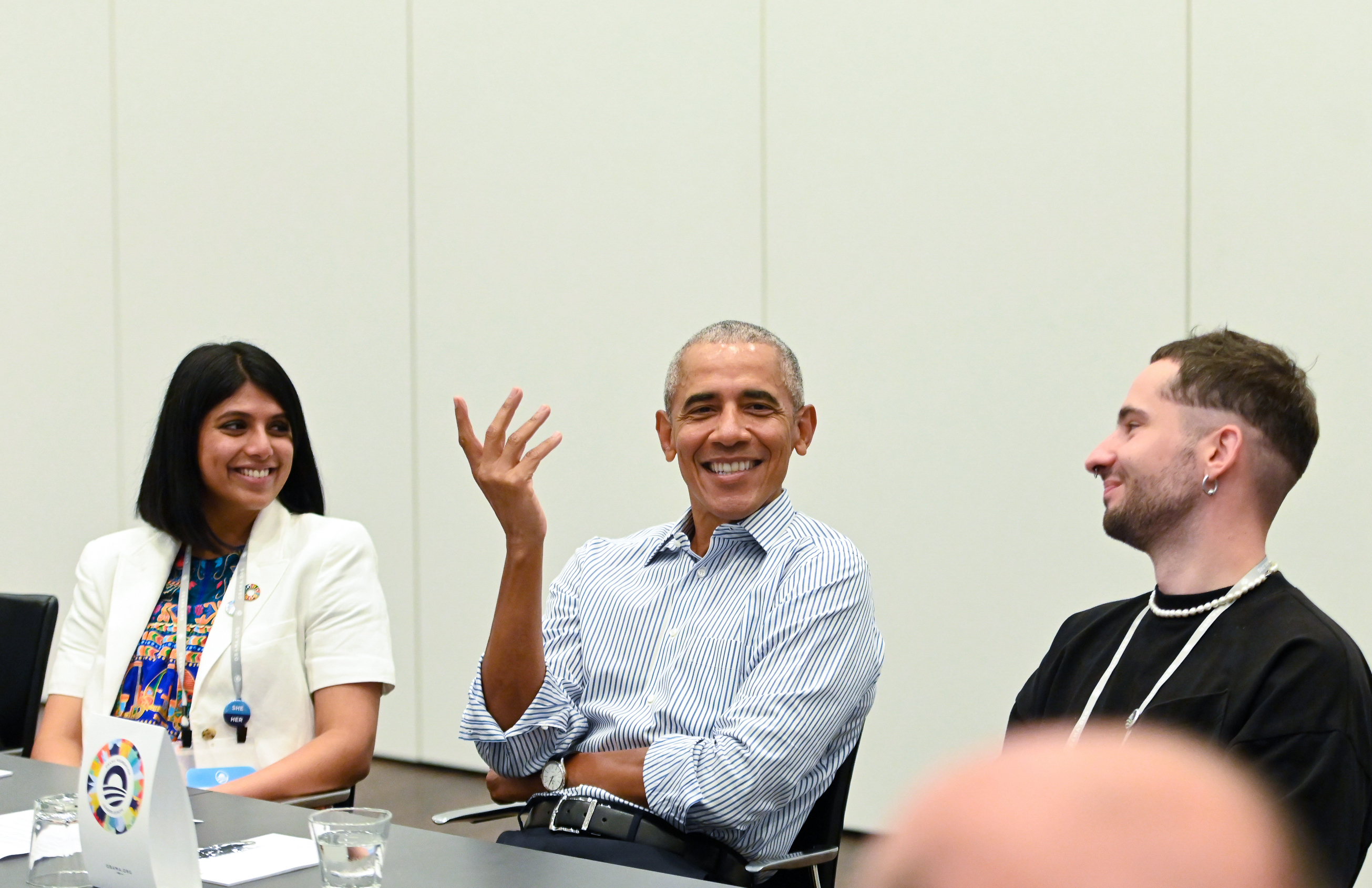A new generation of changemakers
A Tandon class explores ethical entrepreneurship

Graduate students participating in a new course that is among the first in the U.S. to combine social entrepreneurship and leadership using a participatory learning methodology.
NYU Tandon students have no shortage of good ideas, from how to make healthcare more equitable and AI more transparent to how to improve garbage-collection systems in urban areas and ensure that housing is more accessible. But launching an effective social venture takes an understanding of the scope of the problem, an ability to grasp how systems can be reformed, and a talent for combining activism, advocacy, and entrepreneurship.
This past semester, students had a chance to take a course called “Ethical Leadership and Entrepreneurial Systems,” which was offered within the Department of Technology Management and Innovation, but open to interested master’s students from any major. Conceived of and taught by Adjunct Professor Sameera Chukkapalli Holmes, the course was aimed at helping aspiring entrepreneurs to become industry leaders by building socially responsible ventures that are needed now more than ever before.

Chukkapalli Holmes — the founder of Needlab, an organization that designs resilient living environments with and for marginalized communities around the world — was invited to teach the class, which is among the first in the U.S. to combine social entrepreneurship and leadership using a participatory learning methodology, after meeting Professor Anne-Laure Fayard, a former advisor for the Design Lab at Tandon’s MakerSpace, and Professor Pavlos Mourdoukoutas, who oversees NYU Tandon’s Management of Technology master’s program. It attracted an initial cohort of almost 30 students, who learned to identify the root cause and symptoms of a problem, listen to the community affected by it, identify various stakeholders and build partnerships, and glean valuable insight from established impact-oriented social ventures.
“I shared a popular methodology called “public narrative,” Chukkapalli Holmes explains. “That involves drawing upon three threads: the story of why you as an individual are drawn to a particular cause, the story of what the community is called upon to do, and the story of what must be done now, in the current moment. Braided together, those stories form a narrative arc that allows leaders to inspire action towards a social goal. (The concept of leadership is close to Chukkapalli Holmes’s heart; she was chosen as an Obama Foundation Leader — a young, values-driven changemaker that the organization deems to have made a measurable positive impact on their communities.)

The students — who in end-of-semester surveys ranked the class as among the most meaningful of their academic careers — ultimately broke into teams and chose a challenge to tackle. Bharath Sai Reddy Chinthapanti (Computer Science), Taran Iyengar (Computer Science), and Naresh Chandrahasan Senthilkumar (Management of Technology) admit that they were motivated, in part, by the realization that as members of Gen Z, they are sometimes tempted by affordable, “fast-fashion” brands to purchase too many clothes, and horrified by their discovery that manufacturing a single pair of jeans requires some 7,000 liters of water, they envisioned developing an algorithm that would calculate a consumer’s “green score,” based on the number and type of clothing items purchased. In other words, a customer who tends to purchase just a few carefully chosen wardrobe pieces from a brand known for its sustainable practices, like Patagonia, would have a higher green score than one who purchases large quantities of trendy, poorly made articles meant to last only a season.
Another impressive idea came from computer science master’s students Harsh Apte, Himanshu Kumar, and Savani Gokhale, who together tackled the problem of eliminating bias from healthcare AI. The time is right for focusing on the problem, they say, because of the current availability of large datasets, the explosion of AI-based healthcare technologies in the wake of the Covid pandemic, and the evolving demand for accurate and personalized care. They foresee their platform, EquiCareAI, serving as a bridge between the developers of AI programs and the hospital systems that make use of those programs. “Overall, the ‘secret sauce’ of building a system that addresses bias in healthcare AI systems is a combination of data, algorithms, expertise, collaboration, and continuous improvement,” they explain. “By leveraging these factors, we can create a system that effectively detects and mitigates bias in healthcare AI systems, ultimately leading to better health outcomes for patients and a more equitable healthcare system.”
Surbhi Gupta, Vikram Sagi, and Vamsi Tadakamalla had only to stroll through a few New York City neighborhoods to come up with their project, Garbit, a platform that will enable streamlined reporting of garbage conditions so that the city can respond quickly and efficiently to waste-management issues. In the short-term, they propose placing QR codes on garbage bags that would link to 311, so that bags left too long on the street or damaged could be reported easily, even by those not accustomed to using the 311 system, such as young people or residents of marginalized communities, who are often distrustful of city agencies. In the long term, they envision gamifying the reporting process, earning potential rewards for reporting conditions needing attention. “Businesses have enterprise solutions; they can simply pay private services to haul away their garbage, and apartments in wealthier neighborhoods have porters to make sure things are taken care of in a timely way,” the team says. “But what about the rest of us? There’s no reason Chelsea should be cleaner than the South Bronx.”
Among the other student teams were:
- Gender Pay Disparity – Working to reduce gender pay disparity
- Zero hunger in NYC – Fighting food insecurity
- Credible – Making housing rental accessible to international students
- Save me $ – Increasing financial savings for students in New York
- STAN – Reducing transit abuses
- ComePost – Low-cost organic waste recycling for the global south
- Vapeorise – Advocating against vaping among youth.
Chukkapalli Holmes, who is the youngest architect to participate in Barcelona Design Week and the UN-Habitat's first assembly, finds it rewarding to contribute to NYU Tandon’s crossdisciplinary approach to nurturing next-generation leaders. “I want them to be open to trying different strategies and re-working them based on community feedback and participatory thinking, develop leadership skills that will make them capable of working in a variety of environments, and apply their new skills to drive social impact work through entrepreneurship,” she says.
Becoming a social entrepreneur is not magic; you have to identify and solve a problem, make contributions to the economy and community, and just keep it going. I have great hope for the future because I’ve seen firsthand these students’ deep passion for social change. They’re interested in not just finding jobs but finding a purpose.”
— Adjunct Professor Sameera Chukkapalli Holmes




